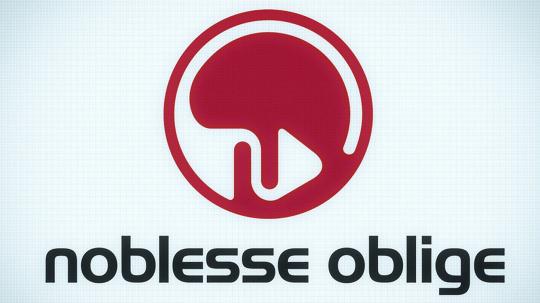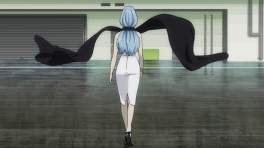The third and final part of why the Production I.G. produced, Kenji Kamiyama written and directed series, Eden of the East, isn't for you. Parts one and two are also available.
5. It's filled with subtleties and symbolism
The title is the first clue that all is not as it seems with Eden of the East, both a reference to the biblical Garden of Eden as well as the book by John Steinbeck (and subsequent movie adaptations) East of Eden, the series doesn't bludgeon the viewer with its metaphors or allegories, but that in itself makes it all the more tricky to discern its true intentions.
The most obvious parallels can be drawn with the well known Garden of Eden story, Akira representing Adam and Saki representing Eve (With Kuroha possibly being Lillith from the Jewish flavour of the story). The issue with this analogy is that beyond superficial similarities, there are no further parallels. Saki does not give in to temptation and lead Takizawa astray, if anything it is the other way around as Akira continues almost oblivious to Saki's overtures. The titular Eden of the East is affixed to the company set up by Kazuomi and includes the Eden image recognition program. The Eden moniker likely applies to the unsullied paradise-like nature of the company, set up by a NEET and employing similarly minded, young staff as seen in the movies.
Numeracy also seems to play a part with varying amounts of series specific concepts: twelve Seleção, eleven missiles, ten billion yen etc. The missiles fell on the 22nd November 2011 which in American date format is 11/22/11, a rather pleasant palindromic date. Ten missiles were originally fired, then subsequently the eleventh, ten billion yen is given to each Seleção and there are twelve selacos in all.
Even philosophy could be gleaned from many different areas, such as Akira's status as a tabula rasa at both the beginning of the series and the movies, essentially reincarnating himself and ensuring that his actions rather than his history define him. Or potential references to Plato's Allegory of the Cave with both Akira and Saki remarking that ongoing events seem like "a movie" as well as Akira's occasional descents into dreamscapes. This could also refer to the idea of modern youth's disconnect with reality. Even the different phrases that litter the openings to the series and movies hint at deeper meanings and implications.
Other small details are dotted around the series, such as the symbol of the sun atop Akira's mall indicating perhaps the light for the twenty thousand NEETs he gathers there, or the globe in Akira's mall "bedroom" that says "The World is Yours".
The list of potential references could go further, but the fundamental question is whether there is a method and reason to the allusions or whether they are simply another fascinating layer to an already onion-skinned production.
6. You're not Japanese
The most firebrand of arguments but one which underpins the phrase "Eden of the East isn't for you". The series is a social critique on a nation that, anecdotally, many feel has over-ripened with one of the most common media past-times to jump on the latest malady seen to be corrupting the nation from within. NEETs, hikkikomoi, an ageing population, political strife, an impotent self-defence force, slavish technological devotion, regression through rampant anthropomorphising, barbarians at the gates; none escape the series' cultural laser. It is an open letter from Kenji Kamiyama to a country and a culture which he, evidently, feels needs rectifying; and though he doesn't have an answer, he has a lot of ideas and tries to ask the right questions.
For people outside of Japan these are academic concerns at best; they do not, and in many ways cannot, fully grasp the influences and pressures that gave birth to Eden of the East; like describing what hearing is, it is impossible to fully convey the innate. The dual stories of exporting of twenty thousand NEETs to the United Arab Emirates and the Seleção's assigned task of "saving" Japan stem from Japanese problems. Those are just the grander narratives though, the sniping at idioms and grievances is relentless: how after days on a ship in cargo containers, almost every NEET goes first in hunt of their mobile phone instead of clothes, food or water; how the mobile phone is the centre of life now achieving everything from buying gum to finding friends; how Kazuomi setting up a business would label him an entrepreneur in the West but still a NEET in Japan; how even after Kazuomi's history, he still scorns his workers for leaving early.
The different Seleção's ways of solving the problem are equally tied to culture. Ryo, the perpetrator of the missile attacks, seeks a return to the militarism of post-war Japan when the threat of death was always close but the result was a unified and focused collective. Daiju turns this on its head by trying to unite the country through a grand terror attack; Jintaro sets Akira up as a commercial icon with focused merchandising much like modern idols; or Taishi's quest to film the "perfect" movie, though how this would fulfil Mr. Outside's stipulations is still unknown.
Rarely has an anime series suffused itself with so many subtle cultural pot-shots, enough to make the series an acerbic critique to some but pass others by unnoticed. That, fundamentally, is why Eden of the East isn't for you. Not an elitist or intellectual condescension but because the messages the series conveys are targeted at a specific collection of people that, like Eden, need to grow and take root from the bottom up to tackle the established order to change things for the better and, perhaps in the process, save Japan.




